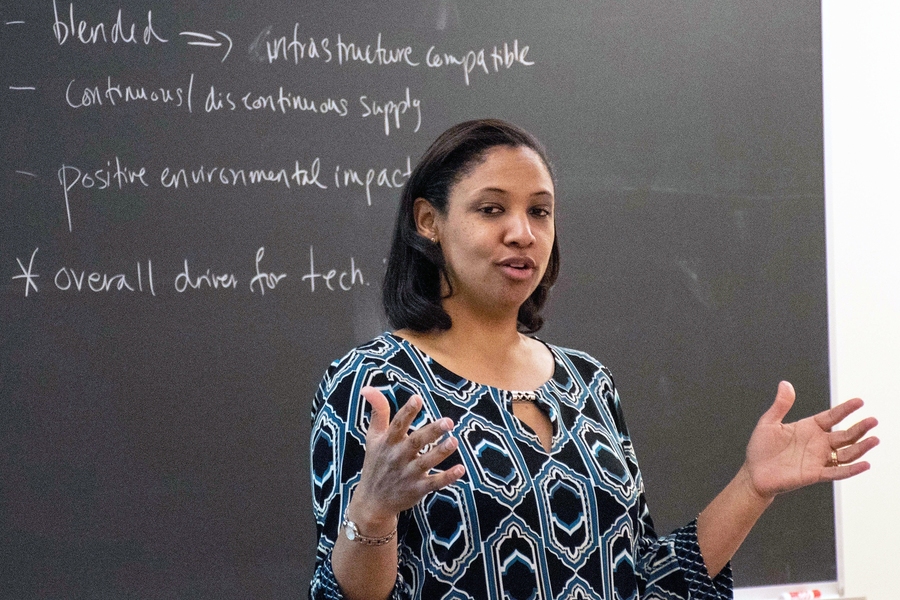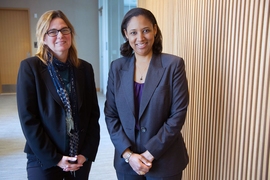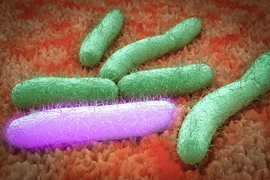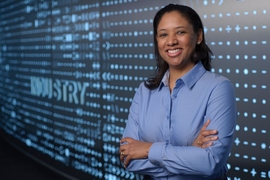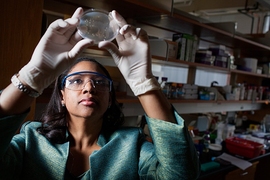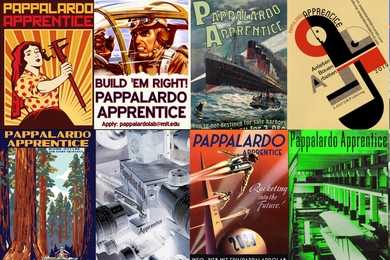Kristala Jones Prather will be the first person to tell you the difference between science and engineering. She’ll also be the first to tell you how important both are to the research process.
“Science is about discovery, and engineering is about application,” Prather says. “The beauty of being a scientist and doing discovery work is the freedom and creativity. For engineers, it’s all about how these discoveries can be applied and solve problems in the real world.”
She would know: Over the course of her career, she’s been both. While working in bioprocess research and development at Merck, Prather delved into the engineering side of biology and chemistry. “My decision to work in industry before pursuing an academic career was very intentional,” she says. “I wanted to get a sense of what to think about when bringing products to market. How is new technology adopted? Can you improve upon existing processes?”
Prather’s early years in industry shaped her knowledge of the process pipeline she is currently seeking to streamline through scientific inquiry. As the Arthur D. Little Professor of Chemical Engineering at MIT, she conducts research that ties together the fields of energy, biology, and chemistry. While biology and energy are most often connected in discussions of biofuels, Prather’s research focuses on a different kind of energy advancement: more energy-efficient processes for the manufacture of biochemicals.
“I tell my students, look at the carpet in this room,” Prather says. “The probability is high that 50 percent or more of the materials in that carpet were produced using oil. So how do we decrease that number?” Prather’s lab works on engineering bacteria to produce biochemicals, thus replacing the fossil-fuel based processes currently responsible for making so many of the world’s materials.
Such research requires expertise in chemical engineering, biological engineering, and genetics. Using genetic engineering, Prather and her team can manipulate the genes of microbes to control the kind and quantity of products they produce. These products could be anything from insulin or human growth hormone to the synthetic materials whose production would otherwise have required the use of oil or other fossil-based products.
“The goal in exploring bio-based methods for creating these chemicals is to design a less energy-intensive process that is still cost-competitive,” she says. “We want to use less energy to get to the same molecules.”
Yet for all the engineering knowledge that Prather gained while she was working in industry, something major was missing.
“When I looked at the part of my job I liked best, it had to do with mentoring young scientists,” she says. “Training and teaching them how to be independent researchers in their fields was the most important and enjoyable part of the job to me.” This realization spurred Prather to make the switch back to academia that she had always been planning. “In industry, you eventually move away from mentoring younger researchers as you move up in the ranks,” she says. “In academia, mentoring is the kernel at the center that always stays the same.”
With her current classes, Prather has ample opportunity to mentor the next generation of MIT scientists and engineers. She teaches 10.10 (Introduction to Chemical Engineering) to first-year and sophomore undergraduates, as well as 10.542 (Biochemical Engineering) for graduate students and upper-level undergrads. Opportunities to reach students present themselves outside of the classroom as well. In fall 2017, Prather was invited by MIT President L. Rafael Reif to be part of a small group of professors addressing incoming first-years at a welcome assembly their first week on campus.
The advice she gave to students then is a message she believes all MIT students need to hear.
“You need to embrace failure,” she says. “Recognize that not everything you attempt is going to work out.”
But there’s an important corollary to this advice. “Students, especially at MIT, should also remember: You belong here,” she says. “It doesn’t matter how many AP classes you come in with or anything like that. And there are a lot of people here to help you get through.”
When asked what the most challenging part of being a professor is, Prather says: “Just how much stuff there is to do. Not the volume, but the diversity — that mix of administrative and academic work.” Still, the most rewarding part of the job is easy to pinpoint. “The students,” she says. “The day a student in my lab defends their thesis is the happiest and saddest day of my life. Happiest because I’m so proud of what they’ve done. But saddest because the time has come for them to leave.”
Prather and her colleague Angela Belcher, the James Mason Crafts Professor of Biological Engineering and Materials Science at MIT, are advancing the future of energy bioscience through their work as co-directors of MITEI’s Low-Carbon Energy Center for Energy Bioscience Research. The goal of the center, Prather says, is to “use the toolbox of biology to engineer solutions to clean energy challenges.”
Prather and Belcher are bringing together a host of biological and chemical engineers from across the Institute to perform research in a wide range of areas. Prather’s own work using genetics to engineer biochemicals is complemented by myriad other projects her colleagues have in the works. Research topics range from biochemical remediation, or the use of bacteria to clean up oil spills; to biological generation of liquid fuels from natural gas; to engineering a virus capable of improving solar cell efficiency.
“We’re really trying to pull together the collective talents of researchers at MIT who are using biology to solve a range of problems,” she says. The results could have positive impacts on critical fields including renewable energy, clean fuel sources, infrastructure, storage, and chemical processing and production.
This article appears in the Spring 2018 issue of Energy Futures, the magazine of the MIT Energy Initiative.
